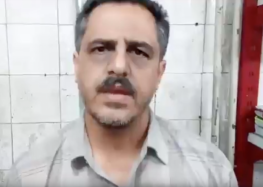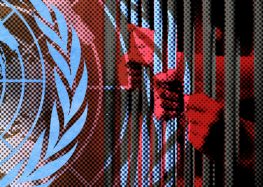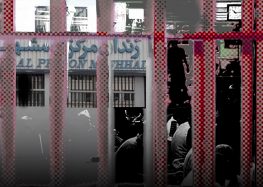Prisoner of Conscience Hashem Khastar Describes Illegal Treatment of Prisoners
In an open letter to the Head of the Judiciary and Minister of Intelligence, Seyed Hashem Khastar, retired teacher and prisoner of conscience who has been in prison for close to two years inside Mashad’s Vakilabad Prison without a single day of furlough, described details of his prosecution and imprisonment, including prisoner abuse, unfair trials, and illegal actions by judicial and police authorities. Khastar’s letter demonstrates the unjust treatment of prisoners of conscience by the Ministry of Intelligence and judicial system. Describing his interrogations, Khastar states that security forces asked him questions about his private life, and have been keeping him among thieves and drug addicts. He mentions his six-minute trial that resulted in a sentence of six years in prison. The International Campaign for Human Rights in Iran published the full text of the letter in its Persian blogs. Here are translated excerpts of the letter in English:
“I was arrested on 15 June 2009, while sitting on a park bench like other people, hearing the Ferdowsi University students chanting slogans on the other side of the street. A cleric who had removed his frock touched my shoulder from behind and said: ‘Are you Mr. Khastar?’ I said yes and he said: ‘Come with me.’… At the Ministry of Intelligence detention center, I was interrogated while blindfolded and facing a wall. The interrogator asked me about my private family life. I was in solitary confinement for six days.”
“I was transferred to the Revolutionary Court again on 27 July 2009 in prison uniform and with hand and foot cuffs. I didn’t have a lawyer and when I defended my legal rights, I was sentenced to six years in prison. One of my cell-mates who is a Sunni cleric was sentenced to ten years in prison, whereas seven others received between one and six years in prison. When his family asked the judge why he was sentenced to ten years, the judge said ‘because he talked too much.’ ‘Talking too much’ means defending yourself before a judge is a crime,” said Khastar, describing his trial in the lower court.
Khastar mentions in his letter that after he was released on bail on 27 August 2009, he tried to find a lawyer to defend him during the allotted 20 days after the verdict is announced in order to file for an appeal. He says the lawyers he picked were afraid to take his case and one lawyer withdrew when he was threatened by the judge. Another lawyer was threatened by the Ministry of Intelligence. Khastar eventually found a lawyer, but was unable to read the defense bill his lawyer submitted, or the ruling issued in his case, which sentenced him to two years in prison. He was arrested again and transferred to prison without being notified of the appeals court ruling in advance.
Describing his prison treatment, Khastar wrote, “After transferring me to prison, they first took me to the Quarantine Ward and then to Hall 102 of Ward 5, where murderers, drug traffickers, and thieves are kept. We slept in the hallways there….they transferred me to Ward 4’s second floor where most of the inmates are drug addicts and thieves…the former Warden had a strange grudge against political prisoners. Whenever I was transferred outside for whatever reason, like going to the hospital or the Medical Examiner, he would make me strip and get naked for his search, and would order that I be searched again.”
Detailing his ailments and cruel treatment by prison authorities, Khastar added, “In 2010, the retinas in both my eyes were torn and I realized that I had developed high blood pressure and I started taking pills to control it. Because the prison food has no fiber (there is no fruit or vegetable) I had to have surgery in my digestive tract. Not once were the prisoners given fruit in six months. They transferred me to Imam Reza Hospital in hand and foot cuffs and a hospital uniform. They took me to my tests with the same hand and foot cuffs. The day they took me to the operating room, they couldn’t find the key to my ankle cuffs, so they postponed the surgery for one day. After my operation, when I regained consciousness, I heard the officers saying that my feet had to be chained to the bed…the doctor said after examining me at 8 a.m. that I had to stay in the hospital one more day, but at 11, the guards said that I had been released. They transferred me to the prison in an ambulance….they transferred me in such a rush that they didn’t take any instructions from the doctor, nor did they bring any of my medical documents from the hospital…they sent me to the prison infirmary and the doctor on duty said that because it was a holiday, the pharmacy was closed and they couldn’t get my prescription filled, so they couldn’t give me any medicine. Three months later, I have not been fully healthy.”






